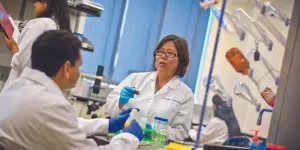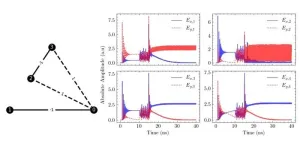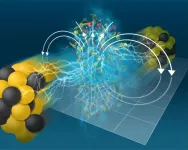(Press-News.org) Lung cancer is not the most common form of cancer, but it is by far the deadliest.
Despite treatments such as surgery, radiation therapy and chemotherapy, only about a quarter of all people with the disease will live more than five years after diagnosis, and lung cancer kills more than 1.8 million people worldwide each year, according to the World Health Organization.
To improve the odds for patients with lung cancer, researchers from The University of Texas at Arlington and UT Southwestern Medical Center have pioneered a novel approach to deliver cancer-killing drugs directly into cancer cells.
“Our method uses the patient's own cellular material as a trojan horse to transport a targeted drug payload directly to the lung cancer cells,” said Kytai T. Nguyen, lead author of a new study on the technique in the peer-reviewed Bioactive Materials and the Alfred R. and Janet H. Potvin Distinguished Professor in Bioengineering at UTA. “The process involves isolating T-cells (a type of immune cell) from the cancer patient and modifying them to express a specific receptor that targets the cancer cells.”
The crucial step in this new technique involves isolating the cell membrane from these modified T-cells, loading the membranes with chemotherapy medications, and then coating them onto tiny drug-delivery granules. These nanoparticles are roughly 1/100 the size of a strand of hair.
When these membrane-coated nanoparticles are injected back into the patient, the cell membrane acts as a guide, directing the nanoparticles to the tumor cells with precision. This approach is designed to deceive the patient's immune system, as the coated nanoparticles mimic the properties of immune cells, avoiding detection and clearance by the body.
“The key advantage of this method lies in its highly targeted nature, which allows it to overcome the limitations of conventional chemotherapy that often lead to detrimental side effects and reduced quality of life for patients,” said co-author Jon Weidanz, associate vice president for research and innovation and a researcher in kinesiology and bioengineering.
“By delivering chemotherapy directly to the tumor cells, the system aims to minimize collateral damage to healthy tissues,” continued Weidanz, who also is a member of UTA’s Multi-Interprofessional Center for Health Informatics.
In the study, researchers loaded the nanoparticles with the anti-cancer drug Cisplatin. The membrane-coated nanoparticles accumulated in parts of the body with the tumors rather than in other parts of the body. As a result, this targeted delivery system was able to reduce the size of the tumors in the control group, demonstrating its efficacy.
“This personalized approach could pave the way for a new era of medicine tailored to each patient's unique characteristics and the specific nature of their tumor,” Nguyen said. “The potential for reduced side effects and improved effectiveness makes our technique a noteworthy advancement in the field of cancer treatment.”
Nguyen’s work was supported by a $250,000 grant from the Cancer Prevention and Research Institute of Texas.
END
Innovative chemotherapy approach shows promise against lung cancer
Method uses patient’s own cells as trojan horse to direct cancer-killing drugs to tumors
2024-02-23
ELSE PRESS RELEASES FROM THIS DATE:
Encoding computers of the future
2024-02-23
In our data-driven era, solving complex problems efficiently is crucial. However, traditional computers often struggle with this task when dealing with a large number of interacting variables, leading to inefficiencies such as the von Neumann bottleneck. A new type of collective state computing has emerged to address this issue by mapping these optimization problems onto something called the Ising problem in magnetism.
Here's how it works: Imagine representing a problem as a graph, where nodes are connected by edges. Each node has two states, either +1 ...
Artifact could be linked to Spanish explorer Coronado's expedition across Texas Panhandle
2024-02-23
DALLAS (SMU) – It’s a small piece of obsidian, just over 5 centimeters long, likely found on a hard-scrabble piece of ranchland in the Texas panhandle. But when SMU anthropologist Matthew Boulanger looks at it, he gets a mental image of Spanish explorer Francisco Vasquez de Coronado making his way across the plains more than 470 years ago in search of a fabled city of gold.
Boulanger believes that the flaked-stone tool with its sharp edge was likely dropped by a member of Coronado’s ...
Do’s and don'ts with direct oral anticoagulants
2024-02-23
Direct oral anticoagulants (DOACs) are a common treatment for patients with a wide variety of cardiovascular conditions. DOACs are the preferred treatment over vitamin K antagonists (VKAs) for many patients with atrial fibrillation or venous thromboembolism, since the latter would have a higher risk of intracranial bleeding and more complex dosing routine. However, new research suggests that DOACs should not be the first line of treatment for every patient who need to treat or prevent blood clots. A systematic overview from researchers at Brigham and Women’s Hospital, a founding member of Mass General Brigham, discusses the efficacy ...
Super strong magnetic fields leave imprint on nuclear matter
2024-02-23
UPTON, NY—A new analysis by the STAR collaboration at the Relativistic Heavy Ion Collider (RHIC), a particle collider at the U.S. Department of Energy’s (DOE) Brookhaven National Laboratory, provides the first direct evidence of the imprint left by what may be the universe’s most powerful magnetic fields on “deconfined” nuclear matter. The evidence comes from measuring the way differently charged particles separate when emerging from collisions of atomic nuclei at this DOE Office of Science user ...
TMEM208 variants cause a new developmental disorder
2024-02-23
A recent study conducted in the lab of Dr. Hugo J. Bellen, distinguished service professor at Baylor College of Medicine and principal investigator at the Jan and Dan Duncan Neurological Research Institute at Texas Children’s Hospital, has discovered a biological role of a specific transmembrane protein called TMEM208.
The study, published in the Proceedings of the National Academy of Sciences, showed that a majority of fruit flies lacking this gene do not survive, and the few that do survive have many developmental defects. Similarly, a child with variants ...
Researchers explore whether gut microbes cause some COVID-19 patients to have higher blood clot risk
2024-02-23
A gut microbial metabolite called 2-methylbutyrylcarnitine (2MBC) plays a role in exacerbating thrombosis -- the formation of blood clots – researchers report February 23rd in the journal Cell Metabolism. The results also revealed that 2MBC is accumulated in individuals with COVID-19, potentially explaining why these patients are at increased risk of thrombosis.
“Our study provides mechanistic insight by implicating 2MBC as a metabolite that links gut microbiota dysbiosis to elevated thrombotic ...
Childhood factors associated with unnatural death through midadulthood
2024-02-23
About The Study: In this urban population-based cohort study of 2,180 participants, no modifiable risk factors of mortality at the level of the individual (e.g., depression or anxiety and substance use) or the family (e.g., household education level) were identified. However, the degree of neighborhood poverty in early childhood was significantly associated with death by unnatural causes (death due to unintentional injury, suicide, and homicide) in early adulthood, suggesting that economic policies are needed to advance health equity in relation to premature mortality.
Authors: Holly C. Wilcox, Ph.D., of the Johns Hopkins Bloomberg ...
Severe COVID-19 in vaccinated adults with hematologic cancers in the Veterans Health Administration
2024-02-23
About The Study: In this case-control study including 6,122 patients with hematologic cancers and SARS-CoV-2 infection, odds of severe COVID-19 remained high through mid-2022 despite vaccination, especially in patients requiring treatment.
Authors: Paul A. Monach, M.D., Ph.D., of the VA Boston Cooperative Studies Program in Boston, is the corresponding author.
To access the embargoed study: Visit our For The Media website at this link https://media.jamanetwork.com/
(doi:10.1001/jamanetworkopen.2024.0288)
Editor’s Note: Please see the article for additional information, including other authors, author contributions ...
Recreational marijuana legalization and workplace injuries among younger workers
2024-02-23
About The Study: In this study, recreational marijuana laws that allow recreational marijuana sales were associated with a 10% increase in workplace injuries among individuals ages 20 to 34. The findings are consistent with the hypothesis that recreational marijuana impedes cognitive function and care among younger workers.
Authors: Joseph J. Sabia, Ph.D., of San Diego State University, is the corresponding author.
To access the embargoed study: Visit our For The Media website at this ...
New study identifies 13 strategies for advancing racial and ethnic equity in the academic health sciences
2024-02-23
BOSTON - Amid continued debate over how to advance diversity and equity in higher education following the Supreme Court’s decision striking down affirmative action, researchers from Massachusetts General Hospital and Northeastern University today issued a “roadmap” of strategies to help academic health institutions maintain their commitments to racial and ethnic diversity among their students, staff, and faculty in academic health sciences.
Their recommendations, published in JAMA Health Forum, outline 13 evidence-based strategies for increasing racial and ethnic equity in graduate-level health programs.
“This ...
LAST 30 PRESS RELEASES:
A biological material that becomes stronger when wet could replace plastics
Glacial feast: Seals caught closer to glaciers had fuller stomachs
Get the picture? High-tech, low-cost lens focuses on global consumer markets
Antimicrobial resistance in foodborne bacteria remains a public health concern in Europe
Safer batteries for storing energy at massive scale
How can you rescue a “kidnapped” robot? A new AI system helps the robot regain its sense of location in dynamic, ever-changing environments
Brainwaves of mothers and children synchronize when playing together – even in an acquired language
A holiday to better recovery
Cal Poly’s fifth Climate Solutions Now conference to take place Feb. 23-27
Mask-wearing during COVID-19 linked to reduced air pollution–triggered heart attack risk in Japan
Achieving cross-coupling reactions of fatty amide reduction radicals via iridium-photorelay catalysis and other strategies
Shorter may be sweeter: Study finds 15-second health ads can curb junk food cravings
Family relationships identified in Stone Age graves on Gotland
Effectiveness of exercise to ease osteoarthritis symptoms likely minimal and transient
Cost of copper must rise double to meet basic copper needs
A gel for wounds that won’t heal
Iron, carbon, and the art of toxic cleanup
Organic soil amendments work together to help sandy soils hold water longer, study finds
Hidden carbon in mangrove soils may play a larger role in climate regulation than previously thought
Weight-loss wonder pills prompt scrutiny of key ingredient
Nonprofit leader Diane Dodge to receive 2026 Penn Nursing Renfield Foundation Award for Global Women’s Health
Maternal smoking during pregnancy may be linked to higher blood pressure in children, NIH study finds
New Lund model aims to shorten the path to life-saving cell and gene therapies
Researchers create ultra-stretchable, liquid-repellent materials via laser ablation
Combining AI with OCT shows potential for detecting lipid-rich plaques in coronary arteries
SeaCast revolutionizes Mediterranean Sea forecasting with AI-powered speed and accuracy
JMIR Publications’ JMIR Bioinformatics and Biotechnology invites submissions on Bridging Data, AI, and Innovation to Transform Health
Honey bees navigate more precisely than previously thought
Air pollution may directly contribute to Alzheimer’s disease
Study finds early imaging after pediatric UTIs may do more harm than good
[Press-News.org] Innovative chemotherapy approach shows promise against lung cancerMethod uses patient’s own cells as trojan horse to direct cancer-killing drugs to tumors




